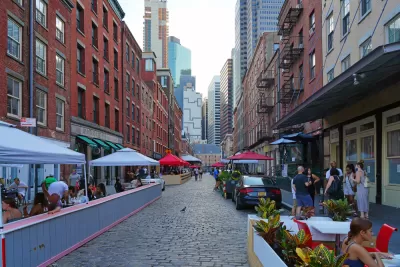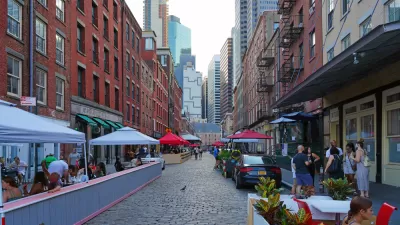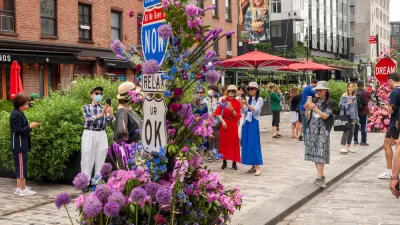The ongoing political controversy about the priorities of the public realm in New York City is likely to last into the next mayoral administration.

Winnie Hu reports that New York City's ongoing battle over the public space reclaimed from automobiles during the pandemic is likely to be determined by the next mayor.
As Planetizen has detailed repeatedly during the pandemic, New York City has led the charge of cities turning over street and parking spaces to human-powered uses like open streets for walking and playing, outdoor dining, and new dedicated bus lanes. While the empty streets of the early pandemic created an opportunity to repurpose space previously devoted to automobile travel and storage, the stage for the current conflict was being set by record levels of New Yorkers buying new cars during the pandemic.
George Arzt, a political consultant and former press secretary to Mayor Edward I. Koch, is quoted by Hu explaining that the controversies surrounding car space in the post-pandemic city is creating "a real migraine" for the city's mayoral candidates as the Democratic primary, scheduled for June 22, approaches.
Meanwhile, traffic safety in the city, like the rest of the nation, got worse in 2020 and continues to see heightened levels of danger in 2021. According to Hu, "There were 99 traffic-related fatalities reported as of May 31, the highest number in that five-month period since 2013…"
To get a better idea of how each of eight leading candidates for the office of mayor would act regarding cars, traffic safety, and transportation equity, Hu and the New York Times sent written questions, summarizing the answers in the source article below. Hu reports universal support among the respondents for congestion pricing and additional bike lanes as well as mixed support for the expansion of the Citi Bike shared-bike system and the expansion of the city's open streets program to low-income and minority neighborhoods. Hu also shares responses to questions about curb management and traffic safety technology.
FULL STORY: Whose Streets? The Next New York Mayor Will Have to Decide.

Trump Administration Could Effectively End Housing Voucher Program
Federal officials are eyeing major cuts to the Section 8 program that helps millions of low-income households pay rent.

Planetizen Federal Action Tracker
A weekly monitor of how Trump’s orders and actions are impacting planners and planning in America.

Ken Jennings Launches Transit Web Series
The Jeopardy champ wants you to ride public transit.

Crime Continues to Drop on Philly, San Francisco Transit Systems
SEPTA and BART both saw significant declines in violent crime in the first quarter of 2025.

How South LA Green Spaces Power Community Health and Hope
Green spaces like South L.A. Wetlands Park are helping South Los Angeles residents promote healthy lifestyles, build community, and advocate for improvements that reflect local needs in historically underserved neighborhoods.

Sacramento Plans ‘Quick-Build’ Road Safety Projects
The city wants to accelerate small-scale safety improvements that use low-cost equipment to make an impact at dangerous intersections.
Urban Design for Planners 1: Software Tools
This six-course series explores essential urban design concepts using open source software and equips planners with the tools they need to participate fully in the urban design process.
Planning for Universal Design
Learn the tools for implementing Universal Design in planning regulations.
Heyer Gruel & Associates PA
Ada County Highway District
Institute for Housing and Urban Development Studies (IHS)
City of Grandview
Harvard GSD Executive Education
Toledo-Lucas County Plan Commissions
Salt Lake City
NYU Wagner Graduate School of Public Service





























